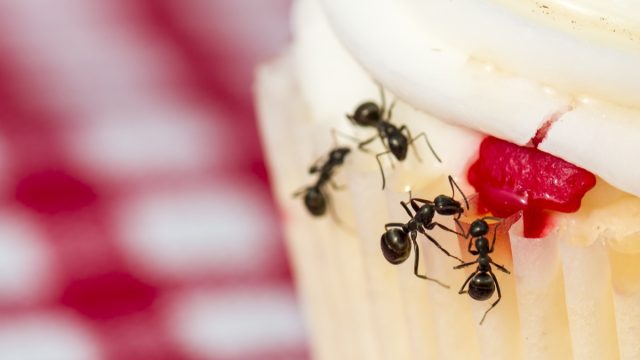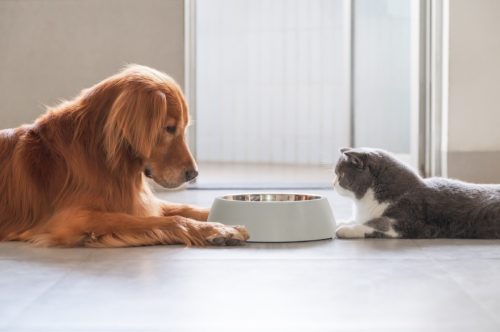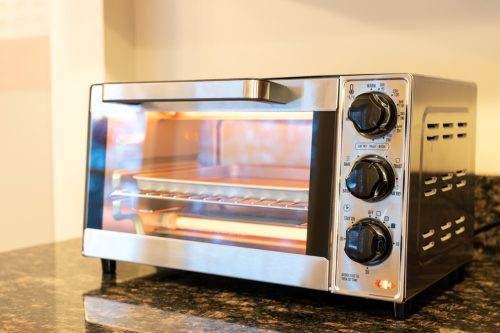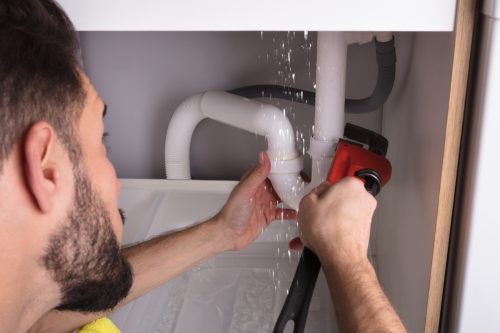5 Surprising Things Attracting Ants Into Your House, Experts Say

Nothing is worse than going to grab some food from your cupboard or pantry and seeing ants crawling all over. These tiny critters are constantly on the hunt for their next meal and your home may have just what they are looking for—especially in the summer. “A couple of reasons they will move inside are a change in weather and the depletion of food sources outside,” says David Price ACE, director of technical services and associate certified entomologist at Mosquito Joe. We all know ants are drawn to sugary spillage and crumbs, but what else brings these unwanted pests around? Keep reading to hear from experts on the surprising things that are attracting ants to your home.
READ THIS NEXT: 8 Signs of a Bug Infestation You Should Never Ignore, Exterminators Say.
1
Essential Oils

You may have heard of using essential oils to repel ants. And it’s true, scents like lemongrass, peppermint, clove, and cedarwood can keep ants at bay. “These blends disrupt the pheromone trails which they use for navigation, communication, and finding food,” says Price.
But on the flip side, some essential oils can bring more ants your way. Just like food or beverages with a lot of sugar, “an essential oil combined with a sugar or perfume, could cause an attraction,” says Price. He suggests steering clear of anything with sugary fruity or floral scents if you are trying to avoid an ant infestation. And if you just can’t resist a sweet blend, be sure to make sure it is properly sealed.
For more home advice delivered straight to your inbox, sign up for our daily newsletter.
2
Pet Food

Ants are always looking for food and they don’t care if that food belongs to you or your pets. “Cats, dogs and other pets can also inadvertently invite ants into your home,” says Jim Fredericks, chief entomologist and vice president of public affairs at National Pest Management Association.
The food and water bowls can attract ants so it’s important to keep them clean. Ryan Farley, the CEO of LawnStarter, notes that ants are attracted to the proteins, fats, and sugars found in pet food. If any of your pet’s food is left out for extended periods it can easily attract ants.
“To avoid this, try to feed your pet at specific times rather than leaving food out all day, and store food in tightly sealed containers,” says Farley. Clean up any water messes immediately as ants are drawn to water sources, too.
3
Kitchen Appliances

It’s pretty common for ants to take up residence in your kitchen—it is the food hot-spot after all. But they may be looking for a snack in obscure places.
“Be on the lookout for places where bits of food may be hidden, crumbs left inside toasters or food residue in dishwashers are attractive to ants,” says Fredericks.
It doesn’t matter if these appliances are closed or not being used, the ants will still be able to find a way in. It’s important to keep everything clean and eliminate anything that can be seen as a food or water source.
4
Yard Landscaping

Any landscaping around the foundation of the home can actually bring in ants—depending on the greenery or flowers you’ve planted there. Matt Freeman, branch manager and pest control expert at Clark’s Termite & Pest Control, explains that roses, gardenias, and crepe myrtles are hosts to many types of aphids (small insects that suck the nutrients out of plants). If your shrubbery has an aphid population, it’s likely ants will be there, too.
“These pests secrete a sugary-rich substance known as ‘honeydew’ that ants love to feed on,” says Freeman.
One way to prevent this is to keep your plants neat and trimmed and don’t give them too much water. “Overwatering near the foundation will create a draw, as aphids provide a food source, and once the ant population becomes greater than the food source, they will move inside,” says Price.
5
Water leaks

Ants need water, so it might not be too much of a surprise to see that water leaks could be giving them a rent-free invitation. “Reducing moisture and standing water around your home can go a long way to help prevent ants,” says Fredericks.
You shouldn’t wait to repair any leaky pipes. Be on the lookout constantly for new areas of moisture so ants have a lesser chance of getting in. Freeman says carpenter ants are especially attracted to damp wood, often the result of a water leak, so you should replace any damaged areas as soon as possible.
“Consider using a dehumidifier in damp basements, crawl spaces, or attics,” says Fredericks. “Outside, ensure that downspouts and gutters are functioning properly so that water flows away from the home’s foundation.”